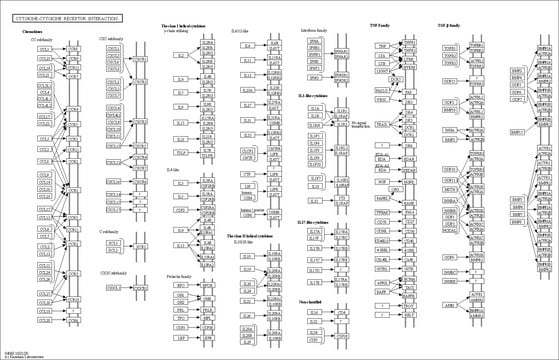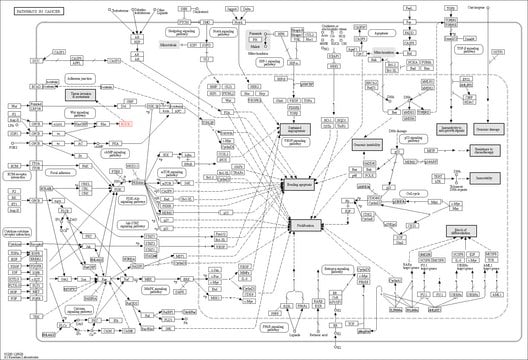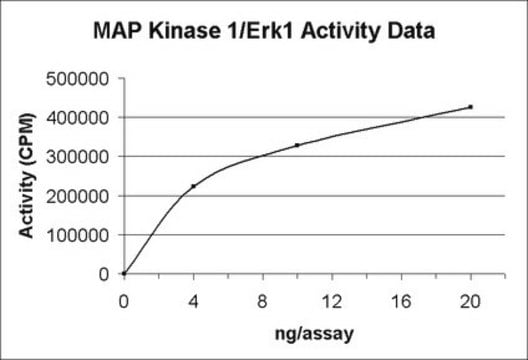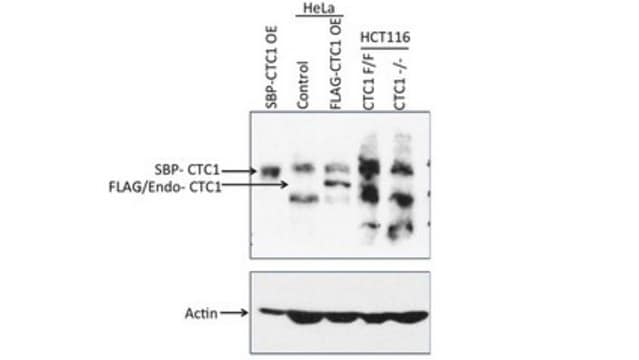推荐产品
生物源
mouse
重組細胞
expressed in E. coli
化驗
≥98% (HPLC)
≥98% (SDS-PAGE)
形狀
lyophilized
分子量
21.9 kDa
包裝
pkg of 20 μg
技術
cell culture | mammalian: suitable
雜質
<0.1 EU/μg endotoxin, tested
顏色
white to off-white
Protein ID登錄號
UniProt登錄號
運輸包裝
wet ice
儲存溫度
−20°C
基因資訊
mouse ... TNFSF13(69583)
一般說明
Research area: Immunology and Cytokines
APRIL (a proliferation-inducing ligand) was identified in 1998 through database mining and is a member of the TNF (tumor necrosis factor) family. APRIL gene is localized to human chromosome 17p13, contains six exons, and is alternatively transcribed to 1.8, 2.1, and 2.4 kb mRNA transcripts. APRIL protein is composed of a cytosolic domain of 28 amino acids, and a transmembrane region. It also contains an exoplasmic region, made up of a stalk and a TNF domain. It shares the highest similarity to BLyS (B lymphocyte stimulator) protein, ~30% sequence similarity in the TNF domain. It is synthesized as a type II transmembrane protein and is proteolytically processed as a mature protein, which is a soluble and non-covalent trimer. Recombinant murine APRIL is a soluble 21.9 kDa protein, consisting of 192 amino acid residues.
APRIL (a proliferation-inducing ligand) was identified in 1998 through database mining and is a member of the TNF (tumor necrosis factor) family. APRIL gene is localized to human chromosome 17p13, contains six exons, and is alternatively transcribed to 1.8, 2.1, and 2.4 kb mRNA transcripts. APRIL protein is composed of a cytosolic domain of 28 amino acids, and a transmembrane region. It also contains an exoplasmic region, made up of a stalk and a TNF domain. It shares the highest similarity to BLyS (B lymphocyte stimulator) protein, ~30% sequence similarity in the TNF domain. It is synthesized as a type II transmembrane protein and is proteolytically processed as a mature protein, which is a soluble and non-covalent trimer. Recombinant murine APRIL is a soluble 21.9 kDa protein, consisting of 192 amino acid residues.
生化/生理作用
A proliferation-inducing ligand (APRIL) and its ligand interaction activate several signaling pathways, including nuclear factor-kappa B (NF-κB), p38, c-Jun N-terminal kinase mitogen-activated protein kinase (JNK MAPK), and Protein Kinase B/Forkhead Box O (AKT/FOXO), which are necessary for promoting the survival and differentiation of B cells and plasma cells. Additionally, APRIL signaling aids in the regulation of cytokine production, the generation of humoral immunity, decreases T cell-dependent antibody responses, and facilitates IgA class switching. These functions highlight the crucial role of APRIL in regulating immune responses. Furthermore, APRIL is also known to induce immune cell apoptosis leading to immunosuppression, and tumor development.
序列
MRREVSRLQR SGGPSQKQGE RPWQSLWEQS PDVLEAWKDG AKSRRRRAVL TQKHKKKHSV LHLVPVNITS KDSDVTEVMW QPVLRRGRGL EAQGDIVRVW DTGIYLLYSQ VLFHDVTFTM GQVVSREGQG RRETLFRCIR SMPSDPDRAY NSCYSAGVFH LHQGDIITVK IPRANAKLSL SPHGTFLGFV KL
外觀
Lyophilized from 10 mM Sodium Acetate, pH 5.0 + 100 mM Arginine.
重構
Centrifuge the vial prior to opening. Reconstitute in water to a concentration of 0.1-1.0 mg/ml. Do not vortex. This solution can be stored at 2-8°C for up to 1 week. For extended storage, it is recommended to further dilute in a buffer containing a carrier protein (example 0.1% BSA) and store in working aliquots at -20°C to -80°C.
儲存類別代碼
11 - Combustible Solids
水污染物質分類(WGK)
WGK 3
閃點(°F)
Not applicable
閃點(°C)
Not applicable
Tumor necrosis factor superfamily member APRIL contributes to fibrotic scar formation after spinal cord injury.
Funk LH. et al.
Journal of Neuroinflammation, 13(1) (2016)
TNFSF13 Is a Novel Onco-Inflammatory Marker and Correlates With Immune Infiltration in Gliomas
Chen R, et al.
Frontiers in immunology (2021)
An APRIL to remember: novel TNF ligands as therapeutic targets.
Dillon SR, et al.
Nature Reviews. Drug Discovery, 5(3), 235-246 (2006)
APRIL Drives a Coordinated but Diverse Response as a Foundation for Plasma Cell Longevity
Stephenson S, et al.
Journal of Immunology, 209(5), 926-937 (2022)
Tarlan Mamedov et al.
PloS one, 14(3), e0213438-e0213438 (2019-03-13)
A plant expression platform with eukaryotic post-translational modification (PTM) machinery has many advantages compared to other protein expression systems. This promising technology is useful for the production of a variety of recombinant proteins including, therapeutic proteins, vaccine antigens, native additives
我们的科学家团队拥有各种研究领域经验,包括生命科学、材料科学、化学合成、色谱、分析及许多其他领域.
联系技术服务部门







